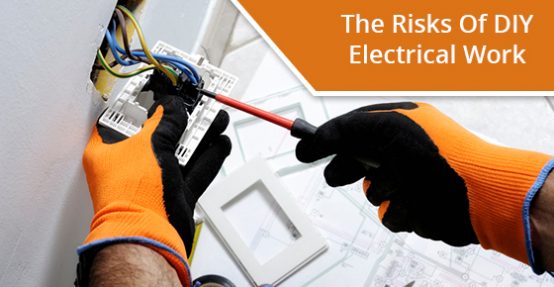
The do-it-yourself culture has been trending for a while now. When faced with a seemingly easy home repair job, the first thing that DIYers think is ‘how difficult can it be?’ With easy access to an abundance of information online, anyone with the time and the will to learn some basic skills can get a job done without paying for professional help.
However, most DIY enthusiasts have encountered some projects that completely overwhelmed them and ended up in disaster. From cracked walls and frail floorboards to personal injuries and extensive property damage, there are some jobs that are best left to the professionals. For instance, electrical repairs can be incredibly dangerous if you have no idea about what you’re doing.
Electricity Repairs You Can Perform Yourself
Generally, you should exercise extreme caution when handling any projects that involve electricity. As with any other tasks that often require a trained professional, like plumbing, there are some minor tasks or repairs that you can handle yourself without much risk, such as replacing a bulb, changing a burnt socket, or installing a fan, provided you turn off the power before starting, preferably at the master switch. You can even invest in some electrical gadgets, like a voltmeter, to test circuits or wires for power.
But if the electrical project goes beyond a simple fix, you should contract a professional electrician as opposed to doing it yourself. Here are some reasons why DIY electrical work may be a terrible idea:
Electrical Shock And Injury
The biggest concern for any person dealing with electrical repairs is the danger of being electrocuted. Electrical shock can vary from mild pulls to deadly, high voltage shock that can kill you in an instant.
In most residences, the typical voltage for power outlets is around 110 volts, which is just enough to give you a jolt to let you know when to stop messing with the electricity.
However, the voltage levels for some household appliances, such as dryers and ovens can reach 240 volts, which is a fatal amount of current.
Through years of training, licensed electricians learn how to work around electricity and perform electrical repairs at any voltage level in a safe manner.
While you can also switch off the circuit breaker and do some electrical work, you lack some essential tools and skills to safely cut wires, test circuits, and perform other kinds of specific work. Any mistakes that leave open wires can expose you, your loved ones, or even your pet to accidental electrocution.
Fire Hazards
Another major concern for DIYers is the high risk of starting an electrical fire due to naked wires or faulty wiring. It only takes one wrong connection to short-circuit and start an electrical fire. Unlike electrical shocks that alert you instantly of mistakes, electrical fire hazards often stay dormant until a power surge or another incident that bypasses the standard safety measures.
The delayed threat can lead to a false sense of security, especially if the problem appears to be fixed. A few weeks later, a premature failure or short in the wiring causes a fire that burns down a room or even the entire building.
Electrical fires can be devastating and deadly if the occupants are unable to escape in time. This is why it is important to contract an experienced electrician to inspect and fix problems with your electrical system.
Not To Code
Some kinds of electrical work require you to have a permit, in which case your only option is to hire a licensed electrician to handle the job. Permits and building codes are usually mandated for the safety of the occupants, and while you can get away with not being up to code, the results might prove to be expensive down the line.
For instance, if your DIY electrical repairs are not up to current standards and lead to some kind of damage, your homeowner’s insurance may be rendered invalid. So even if you trust yourself to fix the problem, any future damage will not be covered by your insurance.
Inspection Issues
Many homeowners are not aware that all their electrical components need to pass inspection for safe usage. The failure to get electrical repairs inspected poses a great danger to all the occupants, and exposes you to heavy fines.
While you can hide your simple and quick electrical fixed behind walls, in the basement, or in the attic, you will likely run into problems when trying to sell your house because it doesn’t meet the criteria. Hiring a licensed electrician can give you peace of mind that every electrical fix will pass inspection.
Costly Repairs Down The Line
With no training or expertise in the functions of various components in an electrical circuit, most DIYers often result to guess work or trial-and-error, which have a high probability of shorting, premature failure, or the need for extensive and costly repairs later on.
Conclusion
There are many serious concerns that you need to take into account before attempting DIY electrical fixes. You need to take every measure to ensure the safety of your family and property, and reduce the risk of costly mistakes that can be easily avoided by hiring a licensed electrician.
© 2023 Licensed Electrical Installation & Service – Hi-Liteelectricinc.ca
All Rights Reserved.
Leave A Comment